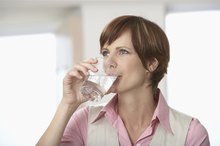Should I Drink Cold Water When Dehydrated?
Dehydration means your body is losing fluids more rapidly than you are replacing them. Water is essential to your health; it accounts for 60 percent of your body weight. Mild dehydration is treatable by increasing your liquid intake, and cold water is appropriate for replenishing your needs.
Definition
Dehydration is a deficit of fluid in your body, either by losing it through sweat, excessive urination, diarrhea or vomiting or by not drinking sufficient liquid. Your body does not function properly without enough fluid, causing problems like dry eyes, a dry mouth and lethargy. Extreme dehydration is life-threatening, although most instances are minor and treatable simply by drinking water or another liquid.
Treatment
What Are the Symptoms That May Occur From Not Drinking Enough Water?
Learn More
Water and other appropriate liquids, like sports drinks with electrolytes, work well for minor dehydration. Cold water is fine, according to registered dietitian Joanne Larsen, although the temperature does not affect the liquid's hydrating abilities. Frozen Popsicles are also appropriate. Cold water is more palatable and refreshing, so keeping it handy may encourage you to drink more throughout the day or if you are doing a strenuous activity, decreasing your dehydration risk. Drinking water and other liquids does not work quickly enough for severe cases. Take a seriously dehydrated person to the hospital for rapid rehydration with IV fluids.
Considerations
Drink cold water or any other liquid slowly when treating dehydration. Drinking too rapidly may cause vomiting, PubMed Health warns, which worsens dehydration because it causes more fluid loss. Small but frequent sips are safer than gulping down large quantities of liquid that might make you queasy.
Prevention
How Much Water Weight Can You Lose?
Learn More
The common rule for daily water consumption is eight glasses, but that may not meet your needs if you are out in hot weather or are physically exerting yourself. Sweat depletes your liquid resources, so perspiring heavily dehydrates you unless you compensate for the loss. Drink extra cold water or other liquids to keep up your body's fluid level. Do not wait until you are thirsty; thirst means dehydration has already started and you may already be losing liquid and body mass.
Other Sources
Water and other beverages are not your only fluid sources. Certain foods help ward off dehydration because they are composed primarily of liquid. For example, tomatoes and watermelons are both 90 percent water, and many other fruits and vegetable are good liquid sources. You generally get 20 percent of your daily water requirement from what you eat rather than what you drink.
Related Articles
References
Writer Bio
Based in Kissimmee, Fla., Barb Nefer is a freelance writer with over 20 years of experience. She is a mental health counselor, finance coach and travel agency owner. Her work has appeared in such magazines as "The Writer" and "Grit" and she authored the book, "So You Want to Be a Counselor."









